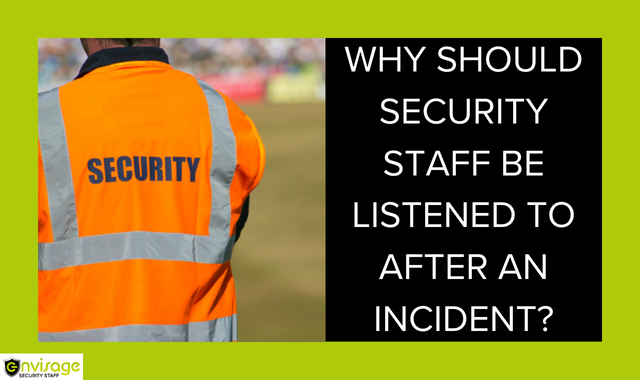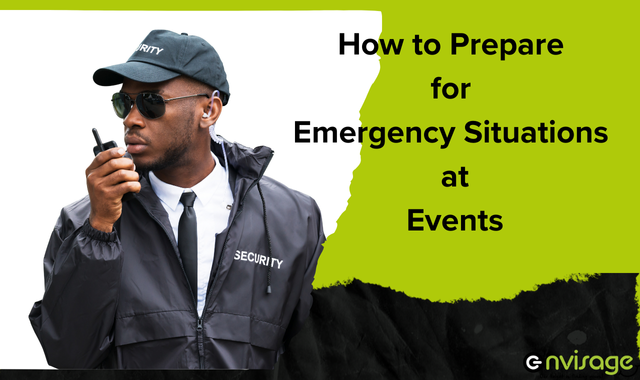How to Plan Security for Large-Scale Events: A Step-by-Step Guide Organising a large-scale event is…

Why Should Security Staff Be Listened to After an Incident?
Why Should Security Staff Be Listened to After an Incident?
Security is a crucial component of any business, particularly for companies operating in the UK, where compliance with regulations and risk mitigation are key concerns. Many businesses hire security staff to protect their premises, assets, and employees, but often, these personnel are overlooked when it comes to post-incident reviews and decision-making.
Ignoring the insights of security professionals after an incident can lead to missed opportunities for improvement, recurring security breaches, and even legal liabilities. Here, we explore why security staff should be listened to after an incident, the benefits of doing so, and how businesses can integrate their insights into broader security strategies.
The Critical Role of Security Staff in Incident Management
Security personnel are the first responders to most incidents that occur within a business environment. Whether it’s an altercation, unauthorised access, or crowd control issue, security staff are at the forefront of managing these situations. Their direct involvement places them in the best position to assess what happened, identify vulnerabilities, and suggest improvements.
Listening to security staff after an incident ensures that a business gets first-hand, detailed accounts of what occurred, rather than relying on second-hand reports that may omit critical details. Furthermore, security personnel often have extensive training and experience in handling emergencies, making their input invaluable when reviewing security measures.
Benefits of Listening to Security Staff After an Incident
1. Improved Risk Assessment
One of the main benefits of taking security staff feedback seriously is improving a company’s risk assessment strategies. Security professionals are trained to observe, report, and analyse threats. By integrating their insights, businesses can make informed decisions on strengthening security protocols.
2. Enhancing Future Security Measures
Security staff can provide crucial recommendations on how to prevent future incidents. For example, they might suggest:
• Improving crowd control barriers
• Adjusting security checkpoints for better screening
• Increasing the number of on-site security personnel at key locations
• Enhancing emergency exit accessibility during high-capacity events
Without their insights, businesses may fail to address key weaknesses that could lead to repeated security breaches.
3. Legal and Compliance Considerations
UK businesses must adhere to various security regulations, including health and safety laws, GDPR, and industry-specific compliance standards. Security personnel can offer crucial evidence and documentation that may be required for legal purposes. Ignoring their reports could lead to non-compliance, potential lawsuits, or fines.
4. Building a Culture of Safety and Trust
When a business listens to its security team, it fosters a culture of safety and trust. Event attendees, staff, and vendors feel more confident knowing that security concerns are taken seriously and that proactive steps are being taken to prevent future incidents. This can also improve staff morale, as employees know they are being protected by a well-informed and responsive security team.
5. Reducing Financial Losses
Security breaches often lead to financial losses, whether through property damage, event disruption, or legal claims. By acting on the insights provided by security personnel, event organisers can mitigate these risks and reduce the likelihood of costly incidents occurring in the future.
Common Reasons Why Security Staff Are Ignored (And Why They Shouldn’t Be)
Despite their invaluable role, security staff are often overlooked in post-incident evaluations. Some common reasons for this include:
• Lack of direct authority: Security staff are sometimes seen as separate from the core event team, leading to their insights being undervalued.
• Management’s over-reliance on external audits: Some companies prefer to rely on third-party security assessments rather than internal feedback.
• Failure to document incidents properly: If security teams are not encouraged to provide detailed reports, their insights may be dismissed as anecdotal.
• Underestimation of frontline experience: Some managers may believe that only senior executives or external consultants can provide valuable security insights.
In reality, security personnel have first-hand experience dealing with threats and should be considered a critical part of the incident review process.
Best Practices for Ensuring Security Staff Are Heard
1. Encourage Detailed Incident Reporting
Ensure that all security incidents are documented thoroughly, with clear details on what happened, the response taken, and recommendations for future prevention. Standardised reporting forms and digital incident management systems can help streamline this process.
2. Conduct Post-Incident Reviews
After any security incident, hold a structured debriefing session that includes security personnel. This allows them to share their observations and recommendations directly with management.
3. Include Security Staff in Policy Development
When updating security policies or implementing new measures, involve security personnel in the discussion. Their insights can ensure that policies are practical and effective.
4. Provide Ongoing Training and Development
Investing in continuous training for security staff ensures they remain up to date with the latest security threats and best practices. This enhances their ability to provide valuable post-incident insights.
5. Create Open Communication Channels
Establish a culture where security personnel feel comfortable speaking up. Implementing an open-door policy or regular meetings with management can encourage them to share their expertise and observations.
Real-World Examples of Security Staff Making a Difference
Example 1: Preventing Stampedes at a Music Festival
A UK-based music festival experienced overcrowding near the main stage, leading to dangerous crowd surges. Security staff noticed early warning signs and intervened by adjusting the barriers and directing attendees to alternative viewing areas. Their proactive measures prevented a potential disaster.
Example 2: Handling Unauthorised Access at an Exhibition
During a large industry exhibition, security personnel identified individuals attempting to gain access with counterfeit passes. By promptly reporting the issue and implementing additional identity verification measures, they prevented a potential security breach and ensured attendee safety.
Example 3: Managing Aggressive Behaviour at a Sporting Event
At a high-profile sports event, security staff noticed tensions rising among rival fans. By increasing patrols and strategically positioning stewards at key areas, they were able to de-escalate the situation before it turned into a full-blown altercation, ensuring the event proceeded without major disruptions.
Listening to Security Staff: A Vital Step Toward Safer Events
Security staff are an essential part of any UK event’s overall safety and risk management strategy. Their first-hand experiences and professional insights make them invaluable assets in the aftermath of an incident. By actively listening to their feedback, event organisers can improve security measures, reduce risks, and foster a culture of safety and trust.
Ignoring security staff after an incident is a costly mistake that can lead to repeated breaches, legal issues, and financial losses. Instead, companies should integrate their expertise into security planning, policy development, and incident review processes.
Ultimately, an event that values its security personnel’s insights will not only be safer but also more successful. Prioritising security staff input is not just a best practice—it is a necessity in today’s ever-evolving security landscape.


